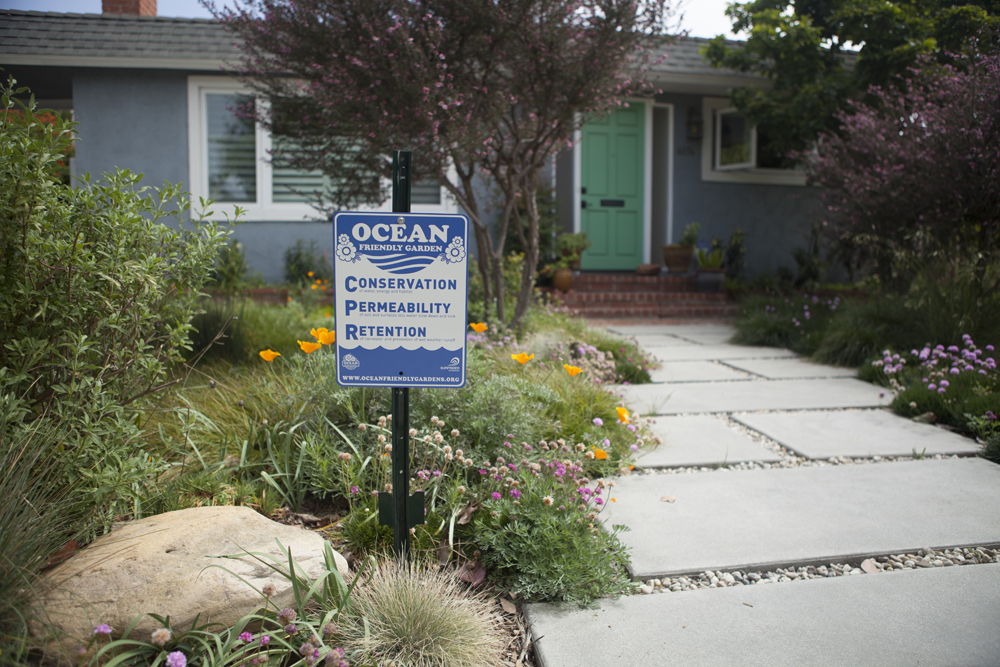
Springtime is here and with warmer temperatures in the air, you will undoubtedly be heading outside to spend relaxing afternoons in the garden. Whether you’re caring for your vegetable garden, fruit trees, flower landscape or yard, you know that, besides the sun, and the TLC it gives to your favorite patch of land, all varieties of plant life need one common thread to survive and thrive–water.
In a typical city, residential properties take up the most land. According to the U.S. Environmental Protection Agency, up to 70 percent of residential water use happens outdoors for watering our landscapes, and much of that is not needed by the plants or runs off into storm drains that lead to the ocean - untreated. For example, there are more than 300 million gallons of runoff every day in Los Angeles County.
Rainy days create pollution, too: every inch of rain falling on a 1,000 square feet of a roof, driveway or parking lot, generates 620 gallons of runoff (for every inch of rain that falls on the City of Los Angeles, 3.8 billion gallons of runoff is generated). Filtering polluted water runoff at a storm drain or at the ocean is expensive and requires high-tech filtering devices.
Did you know your yard can provide the lifeblood of a healthy watershed and ocean? With the proper design, installation and maintenance, you will not only ensure a healthy landscape, but will help reduce water use, pollution and save you time and money. This give you more time to enjoy the outdoors, whether it's in your yard or at the beach.
This is why, in 2009 Surfrider launched its Ocean Friendly Gardens (OFG) program, offering ways you can be part of the solution to ocean pollution at home, work and in your community—and not wait until the government requires you to, like we see happening in California.
Ocean Friendly Gardens is a volunteer-run, hands-on educational training and advocacy program with a goal to protect and revive our watersheds and oceans. In addition to providing valuable information on how landscapes and hard surfaces can prevent water pollution, Surfrider chapters are using this program to train homeowners, do-it-yourselfers and landscape professionals to incorporate the program’s principles into their residential and business practices. Chapters also use the program to motivate local governments to support OFG-oriented policy changes for existing and new development.
Currently, there are 33 Surfrider chapters running various levels of OFG programs. This is up from 23 chapters in 2012. Connections are being made in the Mid-Atlantic, discussions held with Northern California chapters, and programs are strengthening in a number of other areas, including Southern California. Check out some of the great chapter work happening around the country, here.
How does it work?
Surfrider's OFG program helps you look at each landscape as a mini-watershed. A watershed is where all the water drains from a high point (a mountain) to a low point (river and ocean) and uses soil and plants to filter any pollution. Your home, work place, school, park or shopping center are their own watersheds, where the high point might be a building’s roof and the low point being a landscape or driveway. The program helps you apply CPR – Conservation, Permeability and Retention – to any of these sites, using the tips on our OFG Web page, by joining a chapter workshop which works with professional that can help you.
What are the benefits?
Installing an OFG is simple, cost effective and creates multiple benefits:
- Filters pollutants because the microorganisms in living soil eat up pollutants.
- Saves water because soil also acts like a like a sponge, soaking up rainwater water for plants to tap into during dry months.
- Absorbs carbon dioxide, a greenhouse gas, which contributes to climate change.
- Prevents flooding and erosion by slowing down and absorbing water.
- Re-charges groundwater, which also helps to provides water for streams to flows.
- Uses leaves and plant debris as mulch rather than sending it to a landfill, which can generate methane, a greenhouse gas.
- Brings back the natural and beautiful wildlife habitat into your landscape by providing food and water for birds, butterflies and bees.
Learn more, here and then get involved with a Surfrider chapter near you!
